
Archive
|
1. Asean 5: regional security cooperation through selected documents / Chua, Daniel and Lim, Eddie - London: World Scientific, 2018
|
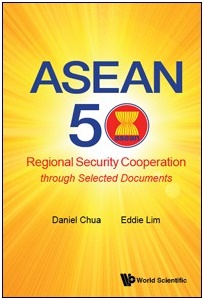 Abstract: ASEAN 50: Regional Security Cooperation through Selected Documents curates key official documents that establish ASEAN as the foundation of Southeast Asia's peace and security. Since 1967, ASEAN has played the crucial role of managing conflicts and maintaining stability in a region shaped by diverse political, economic and socio-cultural dynamics. During the Cold War, ASEAN's ability to keep major power rivalries and intra-mural disputes in check provided the conditions for economic growth in the region. Yet the extent of ASEAN's contributions to the security of Southeast Asia have not been systematically presented. This compendium of official ASEAN declarations, statements, treaties, conventions and workplans demonstrates the activism and innovation of ASEAN member countries in their management of regional security for the past five decades. Abstract: ASEAN 50: Regional Security Cooperation through Selected Documents curates key official documents that establish ASEAN as the foundation of Southeast Asia's peace and security. Since 1967, ASEAN has played the crucial role of managing conflicts and maintaining stability in a region shaped by diverse political, economic and socio-cultural dynamics. During the Cold War, ASEAN's ability to keep major power rivalries and intra-mural disputes in check provided the conditions for economic growth in the region. Yet the extent of ASEAN's contributions to the security of Southeast Asia have not been systematically presented. This compendium of official ASEAN declarations, statements, treaties, conventions and workplans demonstrates the activism and innovation of ASEAN member countries in their management of regional security for the past five decades. |
|
2. The ASEAN miracle: a catalyst for peace / Mahbubani, Kishore and Sng, Jeffery - New York: Oxford University Press, 2018
|
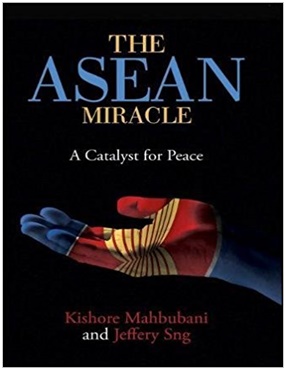 Abstract: The Association of Southeast Asian Nations (ASEAN) is a miracle. In an era of growing cultural pessimism, there is a pervasive belief that different civilizations cannot function together. Yet the ten countries of ASEAN are a thriving counter-example of coexistence. Here, more than 625 million people live together in peace. Abstract: The Association of Southeast Asian Nations (ASEAN) is a miracle. In an era of growing cultural pessimism, there is a pervasive belief that different civilizations cannot function together. Yet the ten countries of ASEAN are a thriving counter-example of coexistence. Here, more than 625 million people live together in peace.
In 1967, leaders from Indonesia, Malaysia, the Philippines, Singapore, and Thailand struck a landmark agreement, forming ASEAN. They had realized that political and economic cooperation would bring greater stability and prosperity to the region. Fifty years and five additional countries later, the alliance has remained one of the world’s most successful collaborations. Kishore Mahbubani and Jeffery Sng explain how this partnership has benefited the ten member countries and why it should serve as a model for other regions of the world, challenging our assumptions about international cooperation. As the world turns to Asia and the United States and China jostle for dominance, the ASEAN region will have an undeniably powerful role in shaping our global systems |
|
3. A History Chinese political thought / Kim, Youngmin - London: Polity, 2018
|
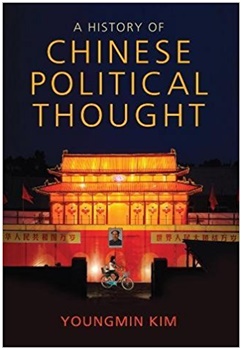 Abstract: China's rapid rise as a regional and global power is one of the most important political developments of the twenty-first century. Yet the West still largely overlooks or oversimplifies the complex ideas and ideals that have shaped China's national and international development from antiquity to the present day. In this beautifully written introductory text, Youngmin Kim offers a uniquely incisive survey of the major themes in Chinese political thought from customary community to empire, exploring their theoretical importance and the different historical contexts in which they arose. Challenging traditional assumptions about Chinese nationalism and Marxist history, Kim shows that 'China' is not a fixed, single identity, but rather a constantly moving target. His probing, interdisciplinary approach traces the long and nuanced history of Chinese thought as a true tradition anchored around certain key themes; many of which began in the early dynasties and still resonate in China today. Abstract: China's rapid rise as a regional and global power is one of the most important political developments of the twenty-first century. Yet the West still largely overlooks or oversimplifies the complex ideas and ideals that have shaped China's national and international development from antiquity to the present day. In this beautifully written introductory text, Youngmin Kim offers a uniquely incisive survey of the major themes in Chinese political thought from customary community to empire, exploring their theoretical importance and the different historical contexts in which they arose. Challenging traditional assumptions about Chinese nationalism and Marxist history, Kim shows that 'China' is not a fixed, single identity, but rather a constantly moving target. His probing, interdisciplinary approach traces the long and nuanced history of Chinese thought as a true tradition anchored around certain key themes; many of which began in the early dynasties and still resonate in China today. |
| 4. Africa reset: a new way forward / Ahlers, Theodore Ed. and Kohli , Harinder S. - New York: Oxford University Press, 2017 |
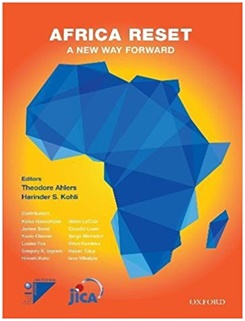 Abstract: Charting a renewed course for Africa, this work looks at the immediate challenges resulting from the global changes and the priority medium-term policy agenda essential to achieve the long-term aspirational vision for the continent till 2065. It maintains a balance between recognizing the challenges Africa faces and putting forth a strategic agenda for exploiting these opportunities, thereby also presenting the possible cost of missing the opportunities. Emphasizing on what can be seen as the two important priorities for Africa-creating quality jobs and eradicating extreme poverty through inclusive economic growth-this study provides policy recommendations to reset the economic trajectory and achieve the desired convergence of Africa. Abstract: Charting a renewed course for Africa, this work looks at the immediate challenges resulting from the global changes and the priority medium-term policy agenda essential to achieve the long-term aspirational vision for the continent till 2065. It maintains a balance between recognizing the challenges Africa faces and putting forth a strategic agenda for exploiting these opportunities, thereby also presenting the possible cost of missing the opportunities. Emphasizing on what can be seen as the two important priorities for Africa-creating quality jobs and eradicating extreme poverty through inclusive economic growth-this study provides policy recommendations to reset the economic trajectory and achieve the desired convergence of Africa. |
|
5. Brexit time: leaving the EU-why, how and when? / Armstrong, Kenneth A. - New York: Cambridge University Press, 2017
|
 Abstract: In June 2016, the United Kingdom shocked the world by voting to leave the European Union. As this book reveals, the historic vote for Brexit marked the culmination of trends in domestic politics and in the UK's relationship with the EU that have been building over many years. Drawing on a wealth of survey evidence collected over more than ten years, this book explains why most people decided to ignore much of the national and international community and vote for Brexit. Drawing on past research on voting in major referendums in Europe and elsewhere, a team of leading academic experts analyse changes in the UK's party system that were catalysts for the referendum vote, including the rise of the UK Independence Party (UKIP), the dynamics of public opinion during an unforgettable and divisive referendum campaign, the factors that influenced how people voted and the likely economic and political impact of this historic decision. Abstract: In June 2016, the United Kingdom shocked the world by voting to leave the European Union. As this book reveals, the historic vote for Brexit marked the culmination of trends in domestic politics and in the UK's relationship with the EU that have been building over many years. Drawing on a wealth of survey evidence collected over more than ten years, this book explains why most people decided to ignore much of the national and international community and vote for Brexit. Drawing on past research on voting in major referendums in Europe and elsewhere, a team of leading academic experts analyse changes in the UK's party system that were catalysts for the referendum vote, including the rise of the UK Independence Party (UKIP), the dynamics of public opinion during an unforgettable and divisive referendum campaign, the factors that influenced how people voted and the likely economic and political impact of this historic decision. |
|
6. Brazil: neoliberalism versus democracy / Saad-Filho, Alfredo and Morais, Lecio - London: Pluto Press, 2018
|
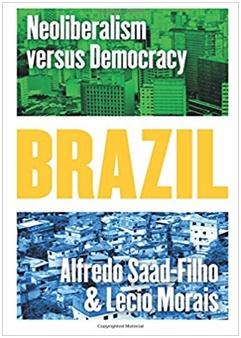 Abstract: With the sixth largest economy in the world, Brazil has played a key international role for decades. It was one of the first “pink wave” administrations in Latin America. In 1994, it was responsible for shutting down the US-sponsored proposal for a Free Trade Area of the Americas. Notably, it is also one of the few large countries where social spending has risen and the distribution of income has improved over the last thirty years. As we saw during the 2014 World Cup protests, however, the country still remains highly unequal, with vast unmet social welfare needs and a precarious infrastructure. In Brazil: Neoliberalism Versus Democracy, Alfredo Saad-Filho and Lecio Morais review the complex paradox that is modern Brazil. Focusing on 1980 to the present, they analyze the tensions between the two dominant systemic political transitions from military rule to first democracy, then neoliberalism. Abstract: With the sixth largest economy in the world, Brazil has played a key international role for decades. It was one of the first “pink wave” administrations in Latin America. In 1994, it was responsible for shutting down the US-sponsored proposal for a Free Trade Area of the Americas. Notably, it is also one of the few large countries where social spending has risen and the distribution of income has improved over the last thirty years. As we saw during the 2014 World Cup protests, however, the country still remains highly unequal, with vast unmet social welfare needs and a precarious infrastructure. In Brazil: Neoliberalism Versus Democracy, Alfredo Saad-Filho and Lecio Morais review the complex paradox that is modern Brazil. Focusing on 1980 to the present, they analyze the tensions between the two dominant systemic political transitions from military rule to first democracy, then neoliberalism. |
|
7. The BRICS and collective financial statecraft / Roberts, Cynthia - New York: Oxford University Press, 2018
|
 Abstract: In the early 21st century, five rising powers (Brazil, Russia, India, China, and South Africa) formed an exclusive international club, the BRICS. Although not extreme revisionists, the BRICS recognize an ongoing global power shift and contest the West's pretensions to permanent stewardship of the existing economic order. Together they exercise collective financial and monetary statecraft to achieve larger foreign policy goals. The BRICS share common resentments-of U.S. dominance of the global financial system, of playing junior roles in economic governance, and of serving as frequent targets of financial sanctions. They also share common objectives, such as obtaining greater financial autonomy and influence within the Bretton Woods institutions. Their financial statecraft ranges from pressure for the internal reform of international organizations and markets to operating outside the system through the creation of both new multilateral institutions and opportunity structures in international financial markets. Abstract: In the early 21st century, five rising powers (Brazil, Russia, India, China, and South Africa) formed an exclusive international club, the BRICS. Although not extreme revisionists, the BRICS recognize an ongoing global power shift and contest the West's pretensions to permanent stewardship of the existing economic order. Together they exercise collective financial and monetary statecraft to achieve larger foreign policy goals. The BRICS share common resentments-of U.S. dominance of the global financial system, of playing junior roles in economic governance, and of serving as frequent targets of financial sanctions. They also share common objectives, such as obtaining greater financial autonomy and influence within the Bretton Woods institutions. Their financial statecraft ranges from pressure for the internal reform of international organizations and markets to operating outside the system through the creation of both new multilateral institutions and opportunity structures in international financial markets. |
|
8. Al-Qaeda 2.0: a critical reader / Holbrook, Donald Ed. - London: Hurst & Company, 2017
|
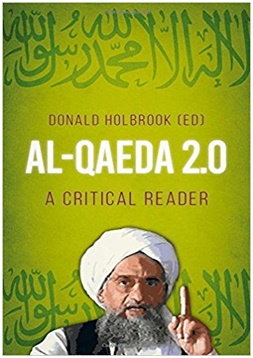 Abstract: On 16 June 2011, three days before his sixtieth birthday, Ayman al-Zawahiri was declared the new leader of Al- Qaeda, replacing the fallen Osama bin Laden. The veteran Egyptian jihadist had little of his predecessor's charisma and enjoyed much less popularity, respect and celebrity. Yet, as scores of jihadi commanders from different organizations have succumbed to their enemies' missiles, bombs and bullets, Zawahiri has soldiered on. His tenure as Al-Qaeda's leader has been marked by some of its darkest and most challenging moments, which have threatened the viability and future of Al-Qaeda's central leadership. The gravest such development has been the emergence of Islamic State as a separate and rival jihadist entity. Abstract: On 16 June 2011, three days before his sixtieth birthday, Ayman al-Zawahiri was declared the new leader of Al- Qaeda, replacing the fallen Osama bin Laden. The veteran Egyptian jihadist had little of his predecessor's charisma and enjoyed much less popularity, respect and celebrity. Yet, as scores of jihadi commanders from different organizations have succumbed to their enemies' missiles, bombs and bullets, Zawahiri has soldiered on. His tenure as Al-Qaeda's leader has been marked by some of its darkest and most challenging moments, which have threatened the viability and future of Al-Qaeda's central leadership. The gravest such development has been the emergence of Islamic State as a separate and rival jihadist entity. |
|
9. China's regional relations in comparative perspective: from harmonious neighbors to strategic partners / Jackson, Steven F. - London: Routledge, 2018
|
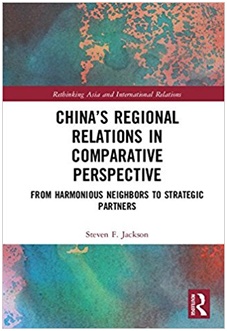 Abstract: China’s relations with its neighbors have evolved since 1949, and in the 21st century many scholars argue that China’s rising power has led it to be increasingly domineering over those smaller countries in Northeast, Southeast, Central, and South Asia. The evolution of China’s regional relations needs to be examined comprehensively, since China counts twenty-seven countries as its "neighbors" large and small. While China’s official policy toward all of these countries is to treat them as "good neighbors" and "partners," some of these relationships have been spectacularly deteriorating, while others have been quietly improving over the last two decades. Abstract: China’s relations with its neighbors have evolved since 1949, and in the 21st century many scholars argue that China’s rising power has led it to be increasingly domineering over those smaller countries in Northeast, Southeast, Central, and South Asia. The evolution of China’s regional relations needs to be examined comprehensively, since China counts twenty-seven countries as its "neighbors" large and small. While China’s official policy toward all of these countries is to treat them as "good neighbors" and "partners," some of these relationships have been spectacularly deteriorating, while others have been quietly improving over the last two decades. |
|
10. Chinese capitalism in southeast Asia: cultures and practices / Santasombat, Yos Ed. - New York: Palgarve Macmillan, 2017
|
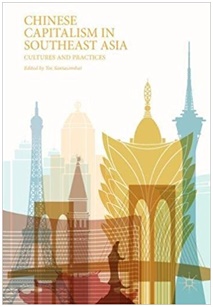 Abstract: This collection examines the historically and geographically specific form of economic organization of the overseas Chinese in Southeast Asia and how it has adapted to the different historical and socio-political contexts of Southeast Asian countries. Moving beyond cultural explanations and traits to focus on the process of evolution and dynamism of situated practices, it argues that Chinese Capitalism is rapidly becoming a form of ‘hybrid capitalism’ and embodies the interdependent of culturally and institutionally specific dynamics at local and regional level, evolving and adapting to different institutional contexts and politico-economic conditions in the host Asian economies. This text also explores the social organization and political economy of the so-called overseas Chinese by examining the changing dynamism of Chinese capitalism in relation to forces of globalization. Abstract: This collection examines the historically and geographically specific form of economic organization of the overseas Chinese in Southeast Asia and how it has adapted to the different historical and socio-political contexts of Southeast Asian countries. Moving beyond cultural explanations and traits to focus on the process of evolution and dynamism of situated practices, it argues that Chinese Capitalism is rapidly becoming a form of ‘hybrid capitalism’ and embodies the interdependent of culturally and institutionally specific dynamics at local and regional level, evolving and adapting to different institutional contexts and politico-economic conditions in the host Asian economies. This text also explores the social organization and political economy of the so-called overseas Chinese by examining the changing dynamism of Chinese capitalism in relation to forces of globalization. |
|
11. China's global rebalancing and the new silk road / Deepak, B. R. Ed. - London: Springer, 2018
|
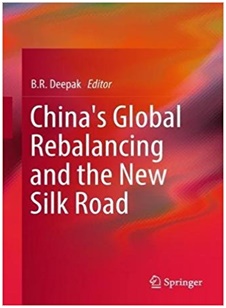 Abstract: This collaborative volume discusses the One Belt One Road, or the New Silk Road, initiative of Chinese President Xi Jinping from the perspectives of the Belt and Road countries. This initiative has been viewed as a re-globalization drive by China in the backdrop of financial crisis of the West and the latter’s increasingly protectionist tendencies of late. Rather than ‘rebalancing’ towards a certain region, this is supposed to be China’s ‘global rebalancing’ aimed at inclusiveness and a win-win partnership. The initiative has raised hopes as well as suspicions about China's goals and intentions; that is, whether this is in sync with China’s foreign policy goals, such as multipolarity, no hegemonic aspirations, and common security, or if this is an antidote to the U.S. foreign policy goals in the region, and China’s ambition to realizing its long-term vision for Asian regional and global order. Abstract: This collaborative volume discusses the One Belt One Road, or the New Silk Road, initiative of Chinese President Xi Jinping from the perspectives of the Belt and Road countries. This initiative has been viewed as a re-globalization drive by China in the backdrop of financial crisis of the West and the latter’s increasingly protectionist tendencies of late. Rather than ‘rebalancing’ towards a certain region, this is supposed to be China’s ‘global rebalancing’ aimed at inclusiveness and a win-win partnership. The initiative has raised hopes as well as suspicions about China's goals and intentions; that is, whether this is in sync with China’s foreign policy goals, such as multipolarity, no hegemonic aspirations, and common security, or if this is an antidote to the U.S. foreign policy goals in the region, and China’s ambition to realizing its long-term vision for Asian regional and global order. |
|
12. China, the United States, and the future of Southeast Asia / Denoon, David B. H. Ed. - New York: New York University Press, 2017
|
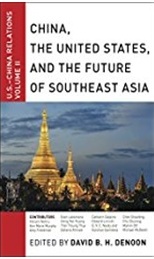 Abstract: With China’s emergence as a powerful entity in Southeast Asia, the region has become an unlikely site of conflict between two of the world’s great powers. The United States, historically regarded as the protector of Pacific Southeast Asia—consisting of nations such as Vietnam, the Philippines, Myanmar, and Malaysia—is now called upon to respond to what many would consider bullying on the part of the Chinese. These and other countries have become the economic and political engine of China. While certainly inclined to help the country’s former allies, the United States has grown undeniably closer to China in the recent decades of global interconnected economic growth. China, the United States, and the Future of Southeast Asia uncovers and delves into the complicated dynamics of this situation. Abstract: With China’s emergence as a powerful entity in Southeast Asia, the region has become an unlikely site of conflict between two of the world’s great powers. The United States, historically regarded as the protector of Pacific Southeast Asia—consisting of nations such as Vietnam, the Philippines, Myanmar, and Malaysia—is now called upon to respond to what many would consider bullying on the part of the Chinese. These and other countries have become the economic and political engine of China. While certainly inclined to help the country’s former allies, the United States has grown undeniably closer to China in the recent decades of global interconnected economic growth. China, the United States, and the Future of Southeast Asia uncovers and delves into the complicated dynamics of this situation. |
|
13. China and transboundary water politics in Asia / Zhang, Hongzhou Ed. and Li, Mingjiang - London: Routledge, 2018
|
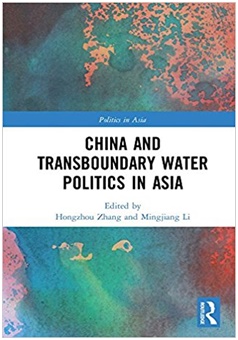 Abstract: Water-related conflicts have a long history and will continue to be a global and regional problem. Asia, with 1.5 billion of its people living in shared river basins, and with very few transboundary rivers governed by treaties, is especially prone to such conflicts. The key to mitigating transboundary water conflicts and advancing cooperation in Asia is largely in the hands of China, the upstream country for most of Asia’s major transboundary rivers. To avert the looming water crisis, apart from spending billions of dollars on domestic water transfer projects such as the South–North Water Diversion Megaproject, as well as on water conservancy and pollution abatement, China has sought to utilize the water resources of the major rivers that run across borders with neighbouring countries. Abstract: Water-related conflicts have a long history and will continue to be a global and regional problem. Asia, with 1.5 billion of its people living in shared river basins, and with very few transboundary rivers governed by treaties, is especially prone to such conflicts. The key to mitigating transboundary water conflicts and advancing cooperation in Asia is largely in the hands of China, the upstream country for most of Asia’s major transboundary rivers. To avert the looming water crisis, apart from spending billions of dollars on domestic water transfer projects such as the South–North Water Diversion Megaproject, as well as on water conservancy and pollution abatement, China has sought to utilize the water resources of the major rivers that run across borders with neighbouring countries. |
|
14. China's international transboundary rivers: politics, security and diplomacy of shared water resources / Xie, Lei Lei Xie and Jia, Shaofeng - London: Routledge, 2018
|
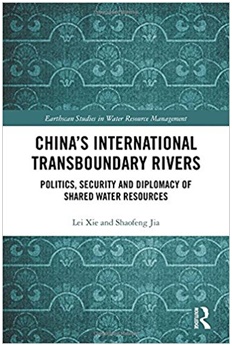 Abstract: China has forty major transboundary watercourses with neighbouring countries, and has frequently been accused of harming its downstream neighbours through its domestic water management policies, such as the construction of dams for hydropower. This book provides an understanding of water security in Asia by investigating how shared water resources affect China’s relationships with neighbouring countries in South, East, Southeast and Central Asia. Since China is an upstream state on most of its shared transboundary rivers, the country’s international water policy is at the core of Asia’s water security. These water disputes have had strong implications for China’s interstate relations, and also influenced its international water policy alongside domestic concerns over water resource management. Abstract: China has forty major transboundary watercourses with neighbouring countries, and has frequently been accused of harming its downstream neighbours through its domestic water management policies, such as the construction of dams for hydropower. This book provides an understanding of water security in Asia by investigating how shared water resources affect China’s relationships with neighbouring countries in South, East, Southeast and Central Asia. Since China is an upstream state on most of its shared transboundary rivers, the country’s international water policy is at the core of Asia’s water security. These water disputes have had strong implications for China’s interstate relations, and also influenced its international water policy alongside domestic concerns over water resource management. |
|
15. The cybersecurity dilemma: hacking, trust, and fear between nations / Buchanan, Ben - London: Hurst & Company, 2016
|
 Abstract: Why do nations break into one another's most important computer networks? There is an obvious answer: to steal valuable information or to attack. But this isn't the full story. This book draws on often-overlooked documents leaked by Edward Snowden, real-world case studies of cyber operations, and policymaker perspectives to show that intruding into other countries' networks has enormous defensive value as well. Two nations, neither of which seeks to harm the other but neither of which trusts the other, will often find it prudent to launch intrusions. This general problem, in which a nation's means of securing itself threatens the security of others and risks escalating tension, is a bedrock concept in international relations and is called the 'security dilemma'. Abstract: Why do nations break into one another's most important computer networks? There is an obvious answer: to steal valuable information or to attack. But this isn't the full story. This book draws on often-overlooked documents leaked by Edward Snowden, real-world case studies of cyber operations, and policymaker perspectives to show that intruding into other countries' networks has enormous defensive value as well. Two nations, neither of which seeks to harm the other but neither of which trusts the other, will often find it prudent to launch intrusions. This general problem, in which a nation's means of securing itself threatens the security of others and risks escalating tension, is a bedrock concept in international relations and is called the 'security dilemma'. |
|
16. The changing security dynamics of the Persian gulf / Ulrichsen, Kristian Coates Ed. - London: Hurst & Company, 2017
|
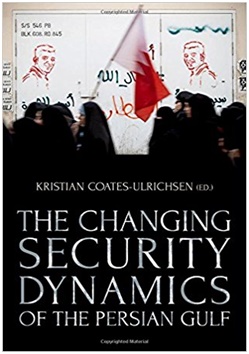 Abstract: The contradictory trends of the 'post-Arab Spring' landscape form both the backdrop to, and the focus of, this volume on the changing security dynamics of the Persian Gulf, defined as the six GCC states plus Iraq and Iran. The political and economic upheaval triggered by the uprisings of 2011, and the rapid emergence of the Islamic State of Iraq and Syria in 2014, have underscored the vulnerability of regional states to an intersection of domestic pressures and external shocks. The initial phase of the uprisings has given way to a series of messy and uncertain transitions that have left societies deeply fractured and ignited violence both within and across states. The bulk of the protests, with the notable exception of Bahrain, occurred outside the Gulf region, but Persian Gulf states were at the forefront of the political, economic, and security response across the Middle East. Abstract: The contradictory trends of the 'post-Arab Spring' landscape form both the backdrop to, and the focus of, this volume on the changing security dynamics of the Persian Gulf, defined as the six GCC states plus Iraq and Iran. The political and economic upheaval triggered by the uprisings of 2011, and the rapid emergence of the Islamic State of Iraq and Syria in 2014, have underscored the vulnerability of regional states to an intersection of domestic pressures and external shocks. The initial phase of the uprisings has given way to a series of messy and uncertain transitions that have left societies deeply fractured and ignited violence both within and across states. The bulk of the protests, with the notable exception of Bahrain, occurred outside the Gulf region, but Persian Gulf states were at the forefront of the political, economic, and security response across the Middle East. |
|
17. Challenged Hegemony: The United States, China, and Russia in the Persian Gulf / by Yetiv, Steve A. and Oskarsson, Katerina - California: Stanford Univ. 2018
|
 Abstract: Few issues in international affairs and energy security animate thinkers more than the classic topic of hegemony, and the case of the Persian Gulf presents particularly fertile ground for considering this concept. Since the 1970s, the region has undergone tumultuous changes, with dramatic shifts in the diplomatic, military, and economic roles of the United States, China, and Russia. In this book, Steve A. Yetiv and Katerina Oskarsson offer a panoramic study of hegemony and foreign powers in the Persian Gulf, offering the most comprehensive, data-driven portrait to date of their evolving relations. The authors argue that the United States has become hegemonic in the Persian Gulf, ultimately protecting oil security for the entire global economy. Through an analysis of official and unofficial diplomatic relations, trade statistics, military records, and more, they provide a detailed account of how U.S. hegemony and oil security have grown in tandem, as, simultaneously, China and Russia have increased their political and economic presence. Abstract: Few issues in international affairs and energy security animate thinkers more than the classic topic of hegemony, and the case of the Persian Gulf presents particularly fertile ground for considering this concept. Since the 1970s, the region has undergone tumultuous changes, with dramatic shifts in the diplomatic, military, and economic roles of the United States, China, and Russia. In this book, Steve A. Yetiv and Katerina Oskarsson offer a panoramic study of hegemony and foreign powers in the Persian Gulf, offering the most comprehensive, data-driven portrait to date of their evolving relations. The authors argue that the United States has become hegemonic in the Persian Gulf, ultimately protecting oil security for the entire global economy. Through an analysis of official and unofficial diplomatic relations, trade statistics, military records, and more, they provide a detailed account of how U.S. hegemony and oil security have grown in tandem, as, simultaneously, China and Russia have increased their political and economic presence. |
|
18. Contemporary issues in Africa's development: whither the African renaissance?/ Olaniyan, Richard A. Ed. and Ifidon, Ehimika A. - New York: Cambridge Scholar, 2018
|
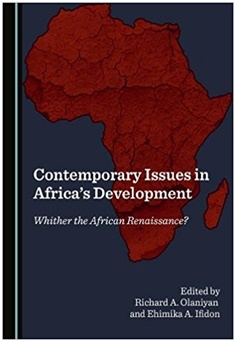 Abstract: This volume reports on the state of crisis in Africa in the early twenty-first century. Africa, on the eve of the independence revolution, was the continent of hope and high expectations. By the third decade of independence, optimism had been replaced by dismality. African states had been beset by ethno-political squabbles, military rule, civil wars, Islamic and insurgent movements, extreme poverty and disease. With the ascent of redemocratization in the 1990s and of new pan-Africanism derived from the formation of the African Union, Africa appeared set to claim its vaunted destiny. This book asks, with hindsight to the first decade of the twenty-first century: how real was the renaissance in African life? If the dismal African condition is a phase in the historical development of Africa, this volume does not see any golden age in the past to which Africa aspires to return. Abstract: This volume reports on the state of crisis in Africa in the early twenty-first century. Africa, on the eve of the independence revolution, was the continent of hope and high expectations. By the third decade of independence, optimism had been replaced by dismality. African states had been beset by ethno-political squabbles, military rule, civil wars, Islamic and insurgent movements, extreme poverty and disease. With the ascent of redemocratization in the 1990s and of new pan-Africanism derived from the formation of the African Union, Africa appeared set to claim its vaunted destiny. This book asks, with hindsight to the first decade of the twenty-first century: how real was the renaissance in African life? If the dismal African condition is a phase in the historical development of Africa, this volume does not see any golden age in the past to which Africa aspires to return. |
|
19. Dr Ambedkar and democracy: an anthology / Jaffrelot, Christophe Ed. and Narender Kumar - New York: Oxford University Press, 2018
|
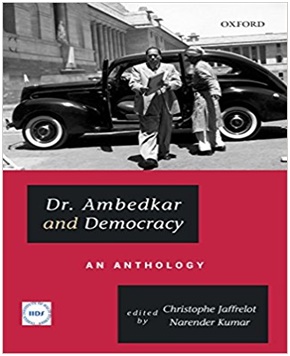 Abstract: This anthology brings together Dr. Bhimrao Ambedkar's works on the theme of Democracy. The editors of this volume have assembled Ambedkar's original writings including his memorandums, speeches, lectures, and talks from 1919-1956 to understand his contribution to Indian political thought and history. Abstract: This anthology brings together Dr. Bhimrao Ambedkar's works on the theme of Democracy. The editors of this volume have assembled Ambedkar's original writings including his memorandums, speeches, lectures, and talks from 1919-1956 to understand his contribution to Indian political thought and history. |
|
20. Dark territory / Kaplan, Fred - London: Simon & Schuster, 2016
|
 Abstract: “An important, disturbing, and gripping history” (Kirkus Reviews, starred review), the never-before-told story of the computer scientists and the NSA, Pentagon, and White House policymakers who invent and employ cyber wars—where every country can be a major power player and every hacker a mass destroyer. In June 1983, President Reagan watched the movie War Games, in which a teenager unwittingly hacks the Pentagon, and asked his top general if the scenario was plausible. The general said it was. This set in motion the first presidential directive on computer security. From the 1991 Gulf War to conflicts in Haiti, Serbia, Syria, the former Soviet republics, Iraq, and Iran, where cyber warfare played a significant role, Dark Territory chronicles a little-known past that shines an unsettling light on our future. Fred Kaplan probes the inner corridors of the National Security Agency, the beyond-top-secret cyber units in the Pentagon, the “information warfare” squads of the military services, and the national security debates in the White House to reveal the details of the officers, policymakers, scientists, and spies who devised this new form of warfare and who have been planning—and (more often than people know) fighting—these wars for decades. Abstract: “An important, disturbing, and gripping history” (Kirkus Reviews, starred review), the never-before-told story of the computer scientists and the NSA, Pentagon, and White House policymakers who invent and employ cyber wars—where every country can be a major power player and every hacker a mass destroyer. In June 1983, President Reagan watched the movie War Games, in which a teenager unwittingly hacks the Pentagon, and asked his top general if the scenario was plausible. The general said it was. This set in motion the first presidential directive on computer security. From the 1991 Gulf War to conflicts in Haiti, Serbia, Syria, the former Soviet republics, Iraq, and Iran, where cyber warfare played a significant role, Dark Territory chronicles a little-known past that shines an unsettling light on our future. Fred Kaplan probes the inner corridors of the National Security Agency, the beyond-top-secret cyber units in the Pentagon, the “information warfare” squads of the military services, and the national security debates in the White House to reveal the details of the officers, policymakers, scientists, and spies who devised this new form of warfare and who have been planning—and (more often than people know) fighting—these wars for decades. |
|
21. The defiant border: the Afghan-Pakistan borderlands in the era of decolonization, 1936-1965 / Leake, Elisabeth - New York: Cambridge University Press, 2017
|
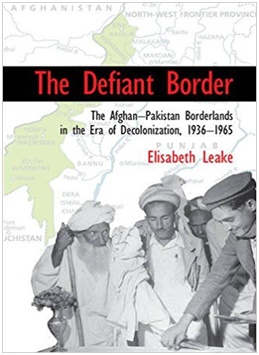 Abstract: The Defiant Border explores why the Afghan-Pakistan borderlands have remained largely independent of state controls from the colonial period into the twenty-first century. This book looks at local Pashtun tribes' modes for evading first British colonial, then Pakistani, governance; the ongoing border dispute between Pakistan and Afghanistan; and continuing interest in the region from Indian, US, British, and Soviet actors. It reveals active attempts by first British, then Pakistani, agents to integrate the tribal region, ranging from development initiatives to violent suppression. The Defiant Border also considers the area's influence on relations between Pakistan, Afghanistan, and India, as well as its role in the United States' increasingly global Cold War policies. Ultimately, the book considers how a region so peripheral to major centers of power has had such an impact on political choices throughout the eras of empire, decolonization, and superpower competition, up to the so-called 'war on terror' Abstract: The Defiant Border explores why the Afghan-Pakistan borderlands have remained largely independent of state controls from the colonial period into the twenty-first century. This book looks at local Pashtun tribes' modes for evading first British colonial, then Pakistani, governance; the ongoing border dispute between Pakistan and Afghanistan; and continuing interest in the region from Indian, US, British, and Soviet actors. It reveals active attempts by first British, then Pakistani, agents to integrate the tribal region, ranging from development initiatives to violent suppression. The Defiant Border also considers the area's influence on relations between Pakistan, Afghanistan, and India, as well as its role in the United States' increasingly global Cold War policies. Ultimately, the book considers how a region so peripheral to major centers of power has had such an impact on political choices throughout the eras of empire, decolonization, and superpower competition, up to the so-called 'war on terror' |
|
22. Deng Xiaoping and China's foreign policy / Keith, Ronald C. - London: Routledge, 2018
|
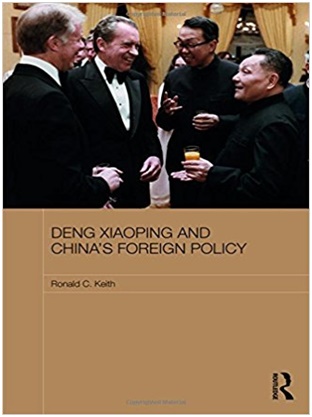 Abstract: This book explores Deng’s foreign policy and shows how he established basic principles for China to have a foreign policy which supported economic development, which stressed “harmony” in the world rather than “hegemony”, and which avoided conflict and nurtured a peaceful approach. The book outlines how Deng worked to normalize relations with both the United States and the Soviet Union, how he was disappointed by the lack of reciprocation by the United States, where relations are still portrayed in terms of “the China threat”, and how the principles established by Deng continue to be adhered to. Abstract: This book explores Deng’s foreign policy and shows how he established basic principles for China to have a foreign policy which supported economic development, which stressed “harmony” in the world rather than “hegemony”, and which avoided conflict and nurtured a peaceful approach. The book outlines how Deng worked to normalize relations with both the United States and the Soviet Union, how he was disappointed by the lack of reciprocation by the United States, where relations are still portrayed in terms of “the China threat”, and how the principles established by Deng continue to be adhered to. |
|
23. EU-China-Africa trilateral relations in a multipolar world: hic sunt dracones / Stahl, Anna Katharina - New York: Palgarve Macmillan, 2018
|
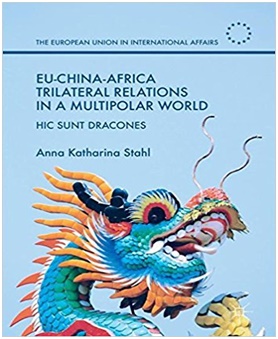 Abstract: This book considers the effect of China’s unprecedented economic growth and more prominent geopolitical role in the twenty-first century. Rising powers considerably alter international relations, leading to the emergence of a multipolar world order that impacts more traditional international players like the European Union (EU). China’s growing economic and diplomatic influence is particularly relevant in Africa, where it presents an alternative to conventional North-South relations and proposes a new type of South-South partnership. Stahl examines the EU’s foreign policy response regarding China’s growing presence in Africa, as well as the EU’s attempts to refocus attention on the African continent. Drawing on a rich body of evidence collected through fieldwork in China and Africa, and extensive expert interviews, the author sheds light on the novel trend of EU-China-Africa trilateral relations. Abstract: This book considers the effect of China’s unprecedented economic growth and more prominent geopolitical role in the twenty-first century. Rising powers considerably alter international relations, leading to the emergence of a multipolar world order that impacts more traditional international players like the European Union (EU). China’s growing economic and diplomatic influence is particularly relevant in Africa, where it presents an alternative to conventional North-South relations and proposes a new type of South-South partnership. Stahl examines the EU’s foreign policy response regarding China’s growing presence in Africa, as well as the EU’s attempts to refocus attention on the African continent. Drawing on a rich body of evidence collected through fieldwork in China and Africa, and extensive expert interviews, the author sheds light on the novel trend of EU-China-Africa trilateral relations. |
|
24. The European union and Europe's new regionalism: the challenge of enlargement, neighborhood, and globalization / Stefanova, Boyka M. - New York: Palgarve Macmillan, 2018
|
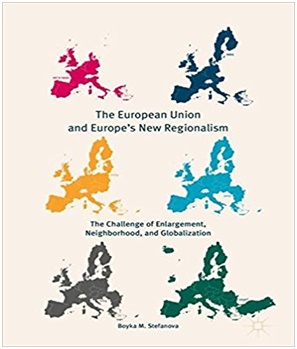 Abstract: This book presents a new approach to studying the European Union’s regional and global relevance. It recasts into a dynamic perspective the three most significant systemic processes that define the EU as a regionalist project: its enlargement, neighborhood, and mega-regional policies. The book argues that these processes collectively demonstrate a dynamic shift of the core tenets of European regionalism from an inward-looking process of region building to an open, selective system of global interactions. Abstract: This book presents a new approach to studying the European Union’s regional and global relevance. It recasts into a dynamic perspective the three most significant systemic processes that define the EU as a regionalist project: its enlargement, neighborhood, and mega-regional policies. The book argues that these processes collectively demonstrate a dynamic shift of the core tenets of European regionalism from an inward-looking process of region building to an open, selective system of global interactions. |
|
25. The envoy: from Kabul to the white house, my journey through a turbulent world / Khalilzad, Zalmay - New York: St. Martin's Press, 2016
|
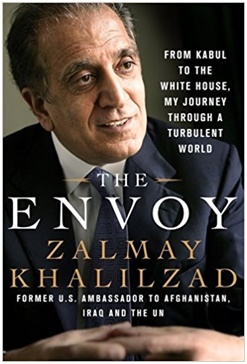 Abstract: Zalmay Khalilzad grew up in a traditional family in the ancient city of Mazar-i-Sharif, Afghanistan. As a teenager, Khalilzad spent a year as an exchange student in California, where after some initial culture shocks he began to see the merits of America's very different way of life. He believed the ideals that make American culture work, like personal initiative, community action, and respect for women, could make a transformative difference to his home country, the Muslim world and beyond. Of course, 17-year-old Khalilzad never imagined that he would one day be in a position to advance such ideas. With 9/11, he found himself uniquely placed to try to shape mutually beneficial relationships between his two worlds. As U.S. Ambassador to Afghanistan and Iraq, he helped craft two constitutions and forge governing coalitions. As U.S. Ambassador to the UN, he used his unique personal diplomacy to advance U.S. interests and values. In The Envoy, Khalilzad details his experiences under three presidential administrations with candid behind-the-scenes insights. He argues that America needs an intelligent, effective foreign policy informed by long-term thinking and supported by bipartisan commitment. Abstract: Zalmay Khalilzad grew up in a traditional family in the ancient city of Mazar-i-Sharif, Afghanistan. As a teenager, Khalilzad spent a year as an exchange student in California, where after some initial culture shocks he began to see the merits of America's very different way of life. He believed the ideals that make American culture work, like personal initiative, community action, and respect for women, could make a transformative difference to his home country, the Muslim world and beyond. Of course, 17-year-old Khalilzad never imagined that he would one day be in a position to advance such ideas. With 9/11, he found himself uniquely placed to try to shape mutually beneficial relationships between his two worlds. As U.S. Ambassador to Afghanistan and Iraq, he helped craft two constitutions and forge governing coalitions. As U.S. Ambassador to the UN, he used his unique personal diplomacy to advance U.S. interests and values. In The Envoy, Khalilzad details his experiences under three presidential administrations with candid behind-the-scenes insights. He argues that America needs an intelligent, effective foreign policy informed by long-term thinking and supported by bipartisan commitment. |
|
26. Europe's fault lines: racism and the rise of the right / Fekete, Liz - London: Verso, 2018
|
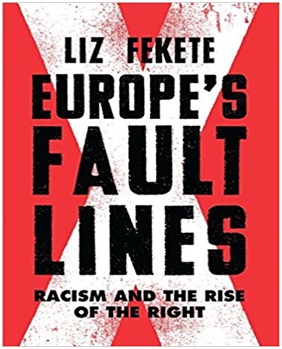 Abstract: An expansive investigation into the relationship between contemporary states and the far-right. It is clear that the right is on the rise, but after Brexit, the election of Donald Trump and the spike in popularity of extreme-right parties across Europe, the question on everyone’s minds is: how did this happen? An expansive investigation of the ways in which a newly configured right interconnects with anti-democratic and illiberal forces at the level of the state, Europe’s Fault Lines provides much-needed answers, revealing some uncomfortable truths. Abstract: An expansive investigation into the relationship between contemporary states and the far-right. It is clear that the right is on the rise, but after Brexit, the election of Donald Trump and the spike in popularity of extreme-right parties across Europe, the question on everyone’s minds is: how did this happen? An expansive investigation of the ways in which a newly configured right interconnects with anti-democratic and illiberal forces at the level of the state, Europe’s Fault Lines provides much-needed answers, revealing some uncomfortable truths. |
|
27. Environmental politics and policy/Mccormick, John - New York: Palgarve Macmillan, 2018
|
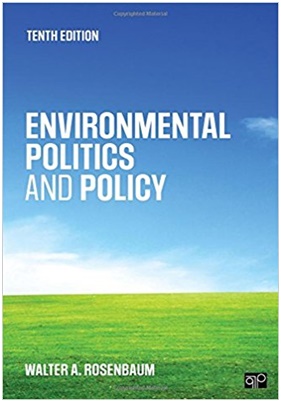 Abstract: This book covers the context of the environmental policy process, as well as exploring specific environmental issues. It examines topics such as toxic and hazardous substances; energy - both fossil fuel and nuclear' public lands; and global policy-making ocusing on climate change and transboundary politics. Abstract: This book covers the context of the environmental policy process, as well as exploring specific environmental issues. It examines topics such as toxic and hazardous substances; energy - both fossil fuel and nuclear' public lands; and global policy-making ocusing on climate change and transboundary politics. |
|
28. Enterprises, localities, people, and policy in the South China Sea: beneath the surface / Spangler, Jonathan Ed. - New York: Palgarve Macmillan, 2018
|
 Abstract: This volume takes readers beneath the surface of the South China Sea by exploring critical but under-researched issues related to the maritime territorial disputes. It draws attention to the importance of private sector, civil society, and subnational actors’ roles in the disputes and sheds light on key policy issues that are addressed less often in the literature. By going beyond mainstream analyses focused solely on issues of traditional security, resource economics, and international law, it offers a fresh and engaging look at the South China Sea disputes. The book is divided into five parts – historical foundations, enterprises, localities, people, and policy – and its chapters investigate historiography in the region, the global defense industry’s role as beneficiary of the disputes, tourism as a territorial strategy, the roles of provinces and local governments, disaster management, confidence-building measures, environmental and science diplomacy, and other topics seldom discussed in other analyses of the South China Sea disputes. The book’s diverse content and fresh perspectives make it an essential read not only for policymakers and those in the international relations community but also for all others interested in gaining a more well-rounded understanding of the many issues at stake in the South China Sea maritime territorial disputes. Abstract: This volume takes readers beneath the surface of the South China Sea by exploring critical but under-researched issues related to the maritime territorial disputes. It draws attention to the importance of private sector, civil society, and subnational actors’ roles in the disputes and sheds light on key policy issues that are addressed less often in the literature. By going beyond mainstream analyses focused solely on issues of traditional security, resource economics, and international law, it offers a fresh and engaging look at the South China Sea disputes. The book is divided into five parts – historical foundations, enterprises, localities, people, and policy – and its chapters investigate historiography in the region, the global defense industry’s role as beneficiary of the disputes, tourism as a territorial strategy, the roles of provinces and local governments, disaster management, confidence-building measures, environmental and science diplomacy, and other topics seldom discussed in other analyses of the South China Sea disputes. The book’s diverse content and fresh perspectives make it an essential read not only for policymakers and those in the international relations community but also for all others interested in gaining a more well-rounded understanding of the many issues at stake in the South China Sea maritime territorial disputes. |
|
29. Everything Under the Heavens: How the Past Helps Shape China's Push for Global / by Howard W. French- New York: Knopf, 2017.
|
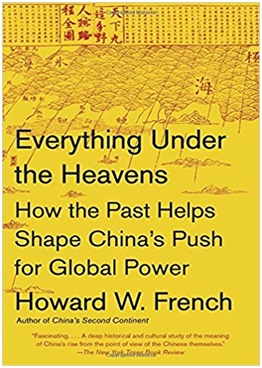 Abstract: For many years after its reform and opening in 1978, China maintained an attitude of false modesty about its ambitions. That façade, reports former New York Times Asia correspondent Howard French, has now been cast off. China is increasingly asserting its place among the global powers, signaling its plans for pan-Asian dominance by building its navy, increasing territorial claims to areas like the South China Sea, and diplomatically bullying smaller players. Underlying this attitude is the millennia-old concept of tian xia, which held that everything “under the heavens” fell within the influence of the Chinese empire. If we understand how this historical identity continues to color current actions, in ways ideological, philosophical, and even legal, we can learn to forecast just what kind of global power China stands to become—as the world order is poised to shift. Steeped in deeply researched history and on-the-ground reporting, this is French at his revelatory best. Abstract: For many years after its reform and opening in 1978, China maintained an attitude of false modesty about its ambitions. That façade, reports former New York Times Asia correspondent Howard French, has now been cast off. China is increasingly asserting its place among the global powers, signaling its plans for pan-Asian dominance by building its navy, increasing territorial claims to areas like the South China Sea, and diplomatically bullying smaller players. Underlying this attitude is the millennia-old concept of tian xia, which held that everything “under the heavens” fell within the influence of the Chinese empire. If we understand how this historical identity continues to color current actions, in ways ideological, philosophical, and even legal, we can learn to forecast just what kind of global power China stands to become—as the world order is poised to shift. Steeped in deeply researched history and on-the-ground reporting, this is French at his revelatory best. |
|
30. The future of East Asia / Hayes, Peter Ed. and Moon, Chung-In - New York: Palgarve Macmillan, 2018
|
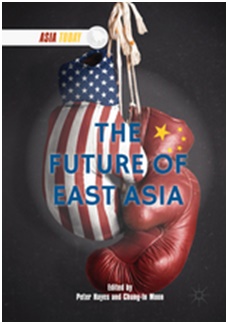 Abstract: This book collects some of the most influential scholars in international relations who focus on Asia globally in exploring the challenges of diplomacy faced in Asia as US policy drastically changes. The president-elect has suggested policies which, if implemented, would radically transform the way that the region functions; what will this mean in practice? China's government is also retrenching nationalist positions; what is the future of China, and what does that mean for the region? A wide range of distinguished scholars, concerned about the future, have contributed their thoughts in an attempt to spark a global dialogue. Abstract: This book collects some of the most influential scholars in international relations who focus on Asia globally in exploring the challenges of diplomacy faced in Asia as US policy drastically changes. The president-elect has suggested policies which, if implemented, would radically transform the way that the region functions; what will this mean in practice? China's government is also retrenching nationalist positions; what is the future of China, and what does that mean for the region? A wide range of distinguished scholars, concerned about the future, have contributed their thoughts in an attempt to spark a global dialogue. |
|
31. Getting nuclear weapons right: managing danger & avoiding disaster / Cimbala, Stephen J. - London: Lynne Rienner, 2018
|
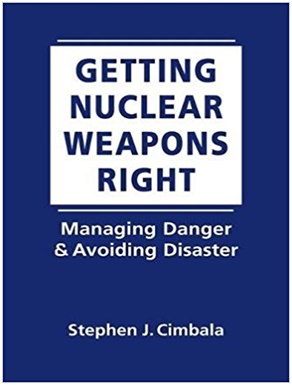 Abstract: Can we avoid nuclear war? Why are we more at risk today than at the end of the Cold War? Can the world powers work together to ensure international stability? Stephen Cimbala provides a comprehensive assessment of these complex issues, ranging from the prospects for nuclear abolition, to the management of nuclear crises, to the imperative need for nuclear arms control worldwide. Abstract: Can we avoid nuclear war? Why are we more at risk today than at the end of the Cold War? Can the world powers work together to ensure international stability? Stephen Cimbala provides a comprehensive assessment of these complex issues, ranging from the prospects for nuclear abolition, to the management of nuclear crises, to the imperative need for nuclear arms control worldwide. |
|
32. The Ghost: The Secret Life of CIA Spymaster James Jesus Angleton / by Jefferson Morley-New York: St. Martin’s Press, 2017
|
 Abstract: In The Ghost, investigative reporter Jefferson Morley tells Angleton’s dramatic story, from his friendship with the poet Ezra Pound through the underground gay milieu of mid-century Washington to the Kennedy assassination to the Watergate scandal. From the agency’s MKULTRA mind-control experiments to the wars of the Mideast, Angleton wielded far more power than anyone knew. Yet during his seemingly lawless reign in the CIA, he also proved himself to be a formidable adversary to our nation’s enemies, acquiring a mythic stature within the CIA that continues to this day. Abstract: In The Ghost, investigative reporter Jefferson Morley tells Angleton’s dramatic story, from his friendship with the poet Ezra Pound through the underground gay milieu of mid-century Washington to the Kennedy assassination to the Watergate scandal. From the agency’s MKULTRA mind-control experiments to the wars of the Mideast, Angleton wielded far more power than anyone knew. Yet during his seemingly lawless reign in the CIA, he also proved himself to be a formidable adversary to our nation’s enemies, acquiring a mythic stature within the CIA that continues to this day. |
|
33. Global politics and violent non-state actors / Ezrow, Natasha - London: Sage, 2017
|
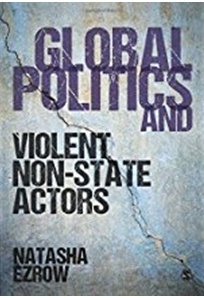 Abstract: Moving beyond terror groups to examine non-state actors including warlords, gangs and private security companies, Violent Non-State Actors: Abstract: Moving beyond terror groups to examine non-state actors including warlords, gangs and private security companies, Violent Non-State Actors:
- Guides you through the core theories and concepts, taking a multidisciplinary approach
- Examines different explanations for the emergence of violent non-state actors as well as strategies for dealing with them
- Weaves in international case studies from groups including the Islamic State, Los Zetas, Hamas, and Al Qaeda, as well as discussion questions, further reading and definitions of key terms
|
|
34. The H-Word: The Peripeteia of Hegemony / by Perry Anderson- London: VERSO, 2017
|
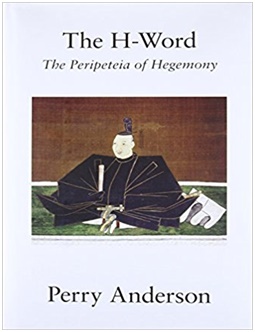 Abstract: In the first full historical study of its fortunes as a concept, Perry Anderson traces its emergence in Ancient Greece and its rediscovery during the upheavals of 1848–1849 in Germany. He then follows its checkered career in revolutionary Russia, fascist Italy, Cold War America, Gaullist France, Thatcher’s Britain, post-colonial India, feudal Japan, Maoist China, eventually arriving at the world of Merkel and May, Bush and Obama. The result is a surprising and fascinating expedition into global intellectual history, ending with reflections on the contemporary political landscape. Abstract: In the first full historical study of its fortunes as a concept, Perry Anderson traces its emergence in Ancient Greece and its rediscovery during the upheavals of 1848–1849 in Germany. He then follows its checkered career in revolutionary Russia, fascist Italy, Cold War America, Gaullist France, Thatcher’s Britain, post-colonial India, feudal Japan, Maoist China, eventually arriving at the world of Merkel and May, Bush and Obama. The result is a surprising and fascinating expedition into global intellectual history, ending with reflections on the contemporary political landscape. |
|
35. International relations since 1945 East, West, North, South / Lundestad, Geir -- 8th Ed. Geir Lundestad - London: Sage, 2018
|
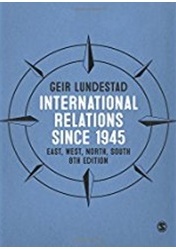 Abstract: Introducing the key events and developments in international relations, this authoritative and engaging book provides students with a clear understanding of the contemporary issues in international politics. Putting the foundations and contexts of international relations at your fingertips, the new Eighth Edition: Abstract: Introducing the key events and developments in international relations, this authoritative and engaging book provides students with a clear understanding of the contemporary issues in international politics. Putting the foundations and contexts of international relations at your fingertips, the new Eighth Edition:
- Provides an account of the world as it has evolved up to 1945
- Extended coverage of topics including population, gender, and the environment
- Includes expanded material on the theory of international relations
- Includes new learning resources, including an "alternative perspectives" box in each chapter
Supports research with fully updated and annotated further reading lists |
| 36. In diasporic lands: Tibetan refugees and their transformation since the exodus / Basu, Sudeep - Hyderabad: Orient BalckSwan, 2018 |
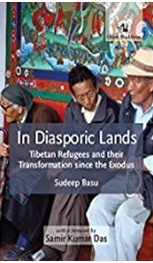 Abstract: The book encompasses seven interconnected chapters dealing with the theoretical and empirical evidences of Tibetan refugees in India and their lived experiences in Darjeeling. The book has mainly discussed that the identity of Tibetan refugees in India has been changing socio-economic and cultural terms in negotiating their ‘belonging’ to an alien country over the time. It also studied that how the concept of refugee, host-dynamics and plural identities plays out in the case of Tibetan refugees in India. However, it moved away from the stereotypes of creating plural identities by Tibetans in host-country, India. The ethnographic analysis of the study reflects the past and ‘exile present’ in India and articulated to understand the ‘lived meanings’ that Tibetan refugees in Darjeeling attach to their life in exile and to the spaces they live and work in. It also provides insights on how this ‘sense of place’ adds meaning and purpose to refuges lives. Abstract: The book encompasses seven interconnected chapters dealing with the theoretical and empirical evidences of Tibetan refugees in India and their lived experiences in Darjeeling. The book has mainly discussed that the identity of Tibetan refugees in India has been changing socio-economic and cultural terms in negotiating their ‘belonging’ to an alien country over the time. It also studied that how the concept of refugee, host-dynamics and plural identities plays out in the case of Tibetan refugees in India. However, it moved away from the stereotypes of creating plural identities by Tibetans in host-country, India. The ethnographic analysis of the study reflects the past and ‘exile present’ in India and articulated to understand the ‘lived meanings’ that Tibetan refugees in Darjeeling attach to their life in exile and to the spaces they live and work in. It also provides insights on how this ‘sense of place’ adds meaning and purpose to refuges lives. |
|
37. The Islamic connection: South Asia and the gulf / Jaffrelot, Christophe Ed.
and Louer, Laurence - Gurgaon: Penguin Books, 2017
|
 Abstract: The region inhabited by the largest number of Muslims-roughly 500 million-today is South Asia. In the course of the Islamization process that began in the eighth century, the region developed a distinct Indo-Islamic civilization that culminated in the Mughal Empire. In the Gulf, while paying lip service to the power centres, including Mecca and Medina, this civilization cultivated its own variety of Islam, which was based on Sufism. Over the last fifty years, pan-Islamic ties have intensified between these two regions. Gathering together some of the best specialists on the subject, this volume explores these ideological, educational and spiritual networks, which have gained momentum due to political strategies, migration flows and increased communications. Abstract: The region inhabited by the largest number of Muslims-roughly 500 million-today is South Asia. In the course of the Islamization process that began in the eighth century, the region developed a distinct Indo-Islamic civilization that culminated in the Mughal Empire. In the Gulf, while paying lip service to the power centres, including Mecca and Medina, this civilization cultivated its own variety of Islam, which was based on Sufism. Over the last fifty years, pan-Islamic ties have intensified between these two regions. Gathering together some of the best specialists on the subject, this volume explores these ideological, educational and spiritual networks, which have gained momentum due to political strategies, migration flows and increased communications. |
|
38. Iran: a modern history / Amanat, Abbas - London: Yale University Press, 2017
|
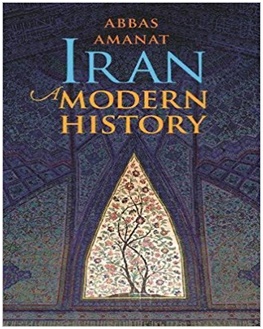 Abstract: The author combines chronological and thematic approaches, exploring events with lasting implications for modern Iran and the world. Drawing on diverse historical scholarship and emphasizing the 20th century, he addresses debates about Iran’s culture and politics. Political history is the driving narrative force, given impetus by Amanat's decades of research and study. He layers the book with discussions of literature, music, and the arts; ideology and religion; economy and society; and cultural identity and heritage. Abstract: The author combines chronological and thematic approaches, exploring events with lasting implications for modern Iran and the world. Drawing on diverse historical scholarship and emphasizing the 20th century, he addresses debates about Iran’s culture and politics. Political history is the driving narrative force, given impetus by Amanat's decades of research and study. He layers the book with discussions of literature, music, and the arts; ideology and religion; economy and society; and cultural identity and heritage. |
|
39. The International political economy of oil and gas / Raszewski, Slawomir Ed. - New York: Palgarve Macmillan, 2018
|
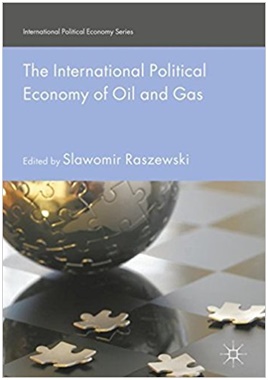 Abstract: This book addresses energy research from four distinct International Political Economy perspectives: energy security, governance, legal and developmental areas. Energy is too important to be neglected by political scientists. Yet, within the mainstream of the discipline energy research still remains a peripheral area of academic enquiry seeking to plug into the discipline’s theoretical debates. The purpose of this book is to assess how existing perspectives fit with our understanding of social science energy research by focusing on the oil and gas dimension. Abstract: This book addresses energy research from four distinct International Political Economy perspectives: energy security, governance, legal and developmental areas. Energy is too important to be neglected by political scientists. Yet, within the mainstream of the discipline energy research still remains a peripheral area of academic enquiry seeking to plug into the discipline’s theoretical debates. The purpose of this book is to assess how existing perspectives fit with our understanding of social science energy research by focusing on the oil and gas dimension. |
|
40. India and China: negotiating spaces in the narratives / Dwivedi, Manan - New Delhi: Kautilya, 2017
|
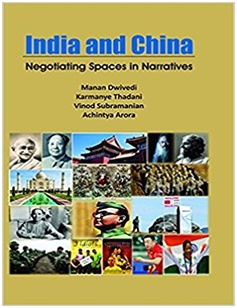 Abstract: It is unfortunate that India-China relations are often reduced to simplistic formulations generally. The reality is that while India’s security challenges have taken on a whole new dimension with China’s rise or that the economic ties between these Asian behemoths is increasingly one-sided in favour of China, the relations between them are actually multi dimensional. Abstract: It is unfortunate that India-China relations are often reduced to simplistic formulations generally. The reality is that while India’s security challenges have taken on a whole new dimension with China’s rise or that the economic ties between these Asian behemoths is increasingly one-sided in favour of China, the relations between them are actually multi dimensional. |
|